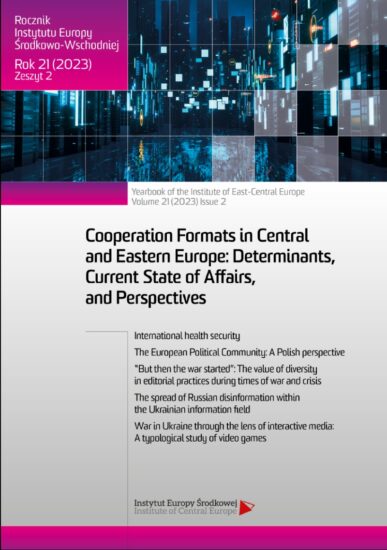Regionalne formaty współpracy a problem bezpieczeństwa militarnego państw pokonfliktowych. Przypadek Procesu Współpracy w Południowo-Wschodniej Europie
ORCID: Paulina Szeląg: 0000-0002-0662-4987
Strony: 91-107
Wydanie: Lublin 2023
DOI: https://doi.org/10.36874/RIESW.2023.2.5
Sposób cytowania: P. Szeląg, Regional cooperation formats and the issue of military security of post-conflict states. Case study of the South-East European Cooperation Process, „Rocznik Instytutu Europy Środkowo-Wschodniej” 21 (2023), z. 2, s. 91-107, DOI: https://doi.org/10.36874/RIESW.2023.2.5
Słowa kluczowe: Bałkany Zachodnie, bezpieczeństwo militarne, Organizacja Paktu Północnoatlantyckiego, państwa pokonfliktowe, Proces Współpracy w Południowo-Wschodniej Europie, Unia Europejska
Abstrakt:
Mimo że Proces Współpracy w Południowo-Wschodniej Europie (South-East European Cooperation Process, SEECP) został zapoczątkowany w 1996 r., tematyka dotycząca jego działalności jest stosunkowo rzadko analizowana. Ten regionalny format współpracy został ustanowiony jako forum dialogu politycznego i konsultacji na najwyższym szczeblu. Zrzesza obecnie 13 państw Europy Południowo-Wschodniej. Jednym z celów SEECP było utrzymanie bezpieczeństwa w regionie, ze szczególnym uwzględnieniem Bałkanów Zachodnich. W artykule dowiedziono, że SEECP ewoluował od 1996 r. i stał się istotnym formatem współpracy. Równocześnie jednak format ten pełni ograniczoną rolę w utrzymaniu bezpieczeństwa militarnego państw pokonfliktowych, zlokalizowanych na Bałkanach Zachodnich. Państwa członkowskie SEECP upatrują w integracji z Unią Europejską i Organizacją Paktu Północnoatlantyckiego realną możliwość utrzymania pokoju i bezpieczeństwa militarnego. W artykule wskazano również, iż ustanowienie SEECP nie wyeliminowało napięć i zamieszek na tle etnicznym w niektórych państwach Bałkanów Zachodnich, a sam format ma jeszcze sporo kwestii do uregulowania w zakresie pojednania i relacji dobrosąsiedzkich. W artykule wykorzystano metodę analizy źródeł pierwotnych i wtórnych, studium przypadku, analizę porównawczą oraz metodę historyczną.
Bibliografia:
1. Art. R.J., Creating a disaster: NATO’s open door policy, „Political Science Quarterly” 1998, vol. 113, no. 3, pp. 383-403.
2. Bieber F., Post-war Bosnia: Ethnicity, inequality and public sector governance, London 2006.
3. Caplan R., Assessing the Dayton Accord: The structural weaknesses of the general framework agreement for peace in Bosnia and Herzegovina, “Diplomacy & Statecraft” 2000, vol. 11, no. 2, pp. 213-232.
4. Charter on Good-Neighbourly Relations, Stability, Security and Cooperation in South-Eastern Europe, Bucharest, 12 February 2000, https://www.rcc.int/files/user/docs/2013.10.03_CHARTER_SEECD.pdf.
5. Chisinau Declaration of the 12th Meeting of the Heads of State and Government of the South-East European Cooperation Process (SEECP), Chisinau, 5 June 2009, https://www.seecp.info/_files/ugd/879876_53da4274dbd144a682f87b231115a2a8.pdf.
6. European Union External Action. What we do: Policies and Actions. Missions and Operations. Working for a stable world and a safer Europe, 23 January 2023, https://www.eeas.europa.eu/eeas/missions-and-operations_en.
7. Hyde A., Seizing the initiative: The importance of regional cooperation in Southeast Europe and the prominent role of the Southeast European cooperation process, “Southeast European and Black Sea Studies” 2004, vol. 4, no. 1, pp.1-22.
8. Istanbul Declaration on Music as a Metaphor of Cultural Dialogue in South-East Europe, Eight Summit of the Heads of State of South-East Europe, Istanbul, 23 June 2010, https://www.seecp.info/_files/ugd/879876_492091b369f54a3caf8b7a8831aeb2d2.pdf.
9. Joint Statement by the Heads of State and Government of Countries of South Eastern Europe, Heraklion, Crete, 4 November 1997, https://www.seecp.info/_files/ugd/879876_4780584f8cf3480ca25c338a5975c9c5.pdf.
10. NATO, NATO’s South East Europe Initiative, https://www.nato.int/seei/home.htm.
11. NATO, Member countries, https://www.nato.int/cps/en/natohq/topics_52044.htm.
12. NATO, The Partnership for Peace Programme, https://www.sto.nato.int/Pages/partnership-for-peace.aspx.
13. Pomorie Declaration of the 11th Meeting of the Heads of State and Government of the South-East European Cooperation Process (SEECP), Pomorie, 21 May 2008, https://www.seecp.info/_files/ugd/879876_75d41c9d1a5f44eead0b844add390242.pdf.
14. Republic of Albania Ministry of Defence, The Multinational Peace Force Southeastern Europe (SEEBRIG), https://www.mod.gov.al/eng/security-policies/relations-with/international-and-regional-organization/95-seebrig.
15. SEECP Antalya Summit Declaration, https://www.seecp.info/_files/ugd/879876_e03f601fa13f448db7841a8d101534f7.pdf.
16. SEECP Brdo Summit Declaration, Brdo, 24 April 2018, https://www.seecp.info/_files/ugd/879876_8f627cebc7174a20aeecf237d8a53558.pdf.
17. SEECP Budva Declaration of the 14th Meeting of the Heads of State and Government of the South-East European Cooperation Process, Budva, 30 June 2011, https://www.seecp.info/_files/ugd/879876_c3703def55844d51b07c41d14f40c85e.pdf.
18. SEECP Bucharest Summit Declaration, Bucharest, 25 June 2014, https://www.seecp.info/_files/ugd/879876_383e3a6a21394351bf7fb2c24a7b6bab.pdf.
19. SEECP Dubrovnik Summit Declaration, Dubrovnik, 30 June 2017, https://www.seecp.info/_files/ugd/879876_57c34753598c4f5dafd815f1ae7edb8b.pdf.
20. SEECP Ohrid Declaration of the Formal Meeting of the Ministers for Foreign Affairs, Ohrid, 31 May 2013, https://www.seecp.info/_files/ugd/879876_456acde395984314a65dc6d15cf222f5.pdf.
21. SEECP Sarajevo-Jahorina Summit Declaration, 9 July 2017, https://www.seecp.info/_files/ugd/879876_9f4fbd70244748dbaf8513040b6f4f38.pdf.
22. SEECP Sofia Summit Declaration 20th Anniversary of the SEECP – Key to regional Cooperation, https://www.seecp.info/_files/ugd/879876_cfb4cbc9079c43779a39f656a4c8c4d9.pdf.
23. SEECP Thessaloniki Summit Declaration, Thessaloniki”, 10 June 2022, https://www.seecp.info/_files/ugd/879876_4c61765071eb4556be9ad52b63c430f6.pdf.
24. SEECP Tirana Summit Declaration, Tirana, 25 May 2015, https://www.seecp.info/_files/ugd/879876_ddae3552fd5e455b94706df3e6cd75c2.pdf.
25. Sofia Declaration on Good-Neighbourly Relations, Stability, Security and Cooperation in the Balkans, Sofia, 6-7 July 1996, https://www.seecp.info/_files/ugd/879876_019fff4792e14d71a3aa4dc420955315.pdf.
26. South-East European Cooperation Process. SEECP Chairmanship, https://www.seecp.info/membership-copy.
27. South-East European Cooperation Process 7th Summit, Sarajevo Declaration, Sarajevo, 21 April 2004, https://www.seecp.info/_files/ugd/879876_5db8b9adcbd0443ebddfd66b1d57ca33.pdf.
28. Summit Declaration of the Countries of South Eastern Europe, Antalya, 12-13 October 1998, https://www.seecp.info/_files/ugd/879876_69d88f03d1564f3fb7e67ec3e940bf46.pdf.
29. Summit Declaration of the Heads of State and Government of South-East European Countries, Skopje, 23 February 2001, https://www.seecp.info/_files/ugd/879876_4ebf9e5a2a8345fbbf04a82237945f8c.pdf.
30. Thessaloniki Declaration of the Ninth Meeting of the Heads of State and Government of the South-East European Cooperation Process (SEECP) Together in Europe, Thessaloniki, 4 May 2006, https://www.seecp.info/_files/ugd/879876_f2210f9008134425b8cec4dcd3d5f6d4.pdf.
31. United Nations, International Criminal Tribunal for the former Yugoslavia, https://www.icty.org/.
32. United Nations Security Council Resolution 1244 (1999), S/RES/1244 (1999), 10 June 1999, SEDM Process Portal, https://www.sedmprocess.org/.
33. Wunsch N., EU enlargement and civil society in the Western Balkans. From mobilisation to empowerment, Cham 2018.
34. 33. Zagreb Declaration of the 10th Meeting of the Heads of State and Government of the South-East European Co-operation Process (SEECP) Europe’s New South East, Zagreb, 11 May 2007, https://www.seecp.info/_files/ugd/879876_fc126484c23046e6b8a6104fcb28d20f.pdf.
Słowa kluczowe: Bałkany Zachodnie, bezpieczeństwo militarne, Organizacja Paktu Północnoatlantyckiego, państwa pokonfliktowe, Proces Współpracy w Południowo-Wschodniej Europie, Unia Europejska
PDF: Pobierz